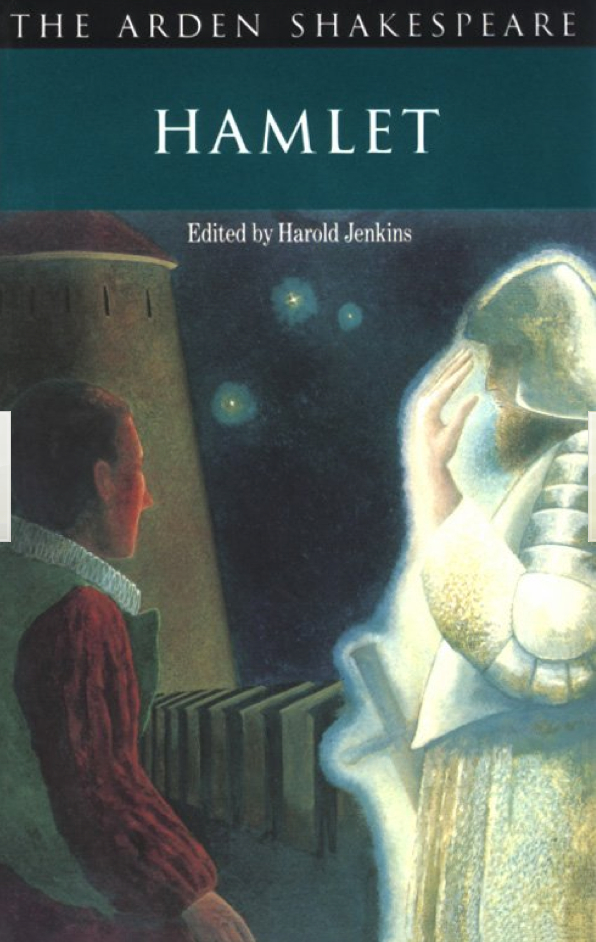
Tentative Schedule: Please Standby
Two students will co-lead class each Thursday on the film screened the preceding Tuesday.
YALE FILM STUDIES' Film Analysis Web Site 2.0 is a great resource to learn how to watch films critically. Check it out so that you can learn the basic terms of film analysis and become increasingly conscious of the soundtrack, camera angles, lighting, focus, film stock (color or b&w), length of take, editing, and so on all make up a film's formal design. By learning the basics of film analysis, you can learn how to "read" films as closely as you have been learning to read literature. In both cases, you want to read the the story in relation to its specific medium (print or film) and with close formal attentiveness. Paying careful attention to a small part or parts of a film (or play) can tell you a lot about the whole film (or play). For example, one could write an essay on Hamlet focusing on the line, "The time is out of joint." Or one could write on essay about Branagh's Hamlet based on the opening and closing shots.
August 24: What's the Worst Thing You Can Do to Hamlet (Shakespeare)? Cruxes and Crossroads Words, Words, Words: Searching for a word (and related words) in Hamlet online. William Empson, The Structure of Complex Words
August 24: FiIm Screening tonight periods E1-E3 in TUR 2334: Hamlet (Kenneth Branagh, dir. 1996)
Hamlet editions, translations, and film clippings
All film screenings are held on T periods E1-E3 in TUR 2334. They are free. All films will be discussed on Thursdays.
August 26: Is Branagh's Hamlet the definitive edition he claims it to be? Can any edition be anything more than "indefinitive?"
What's Wrong with this iPcture? The Hamlet meets ghost Dad scene in Branagh's Hamlet
RECOMMENDED READING: Sigmund Freud, "The Uncanny" and Stephen Greenbatt, "Benefit of Clergy" (click on the link) and "Dark Hints" in Stephen Greenblatt, Hamlet in Purgatory, 229-237 (get on UF course reserves)
Do the required readings for Sept 31 below. Email me two discussion questions on how the Jenkins discussion of the "editorial problem" (pp. 74-82) and his notes to the text bear on your (re)reading of Acts 1 and 2 by 7:00 p.m. Monday, August 30 at: [email protected] (that's not a typo). I will post all of your questions on the class listserv.
August 31: Conflating the Three Editions of Hamlets into one "Hamlet"
REQUIRED READING: Harold Jenkins, ed. Arden Two edition of Hamlet (1982), pp. 74-82 and Acts 1 and 2 (bring the book to class).
Hamlet as spectral text. Hamlet ghost scenes in the play, comparing film versions of the scenes (Olivier, Zeffirelli, Branagh) and how the ghost is made both spectral and corporeal (through the use of flashback).
August 31: FiIm Screening: Hamlet (dir. Gregory Doran, 2009), starring David Tennant as Hamlet.

Arden 2 Hamlet edition as translation of conflated Hamlets; film adaptation as textual editing, translation from one medium into another. Comprehensive as Comprehensible and Complete
Recommended Reading: Friedrich Schlegel, "On Incomprehensibility"
ASSIGNMENT DUE September 6: Short answer discussion question: Based on the required readings below, do agree with Thomson and Taylor's decision to edit Hamlet as "conservatively" as they have? Why or why not? You list your points in random order, but write them out in complete sentences. Max. 500 words.
September 7: REQUIRED READING: William Shakespeare, Hamlet (Arden Shakespeare: Third Series) ed. Anne Thompson and Neil Taylor (2006), Act 1-3. 2.2 (pp. 147-295); Appendix 2 "Editorial Principles," pp. 509-22 and pp. 74-94 of the "Introduction." (You'll need the book). The UF bookstore has this book (See the book cover below).
FiIm Screening: September 7: Hamlet (di. Laurence Olivier, 1948)
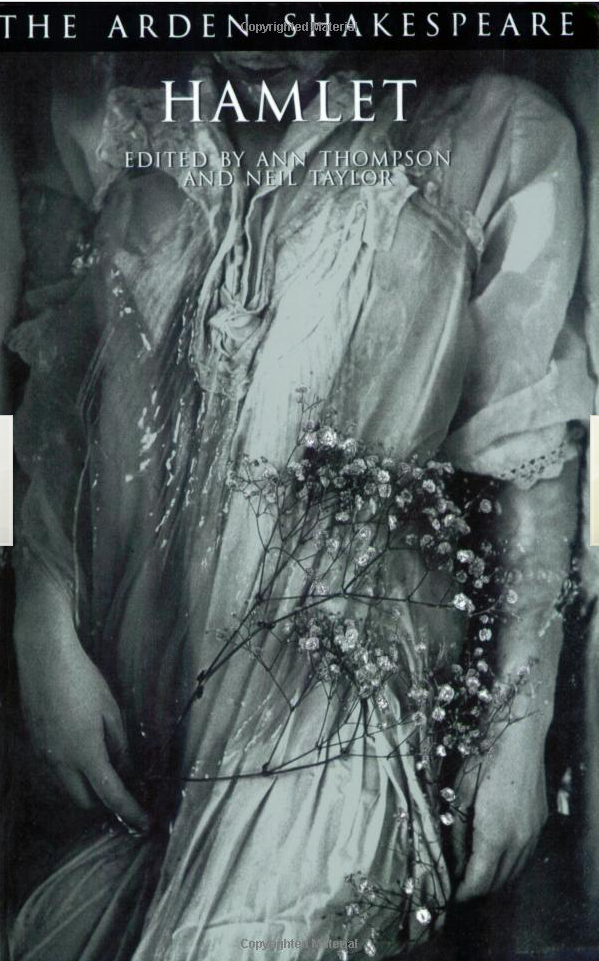
ASSIGNMENT DUE September 8 by 7:00 p.m.: two discussion questions on Olivier's Hamlet
September 9: REQUIRED READING: NONE
FYI: Compare to a facsimile of the Second Quarto (1604-05)
With Branagh's, Doran's, and Olivier's Hamlet in mind, we will begin to discuss both how film adaptation is like textual editing and how editing Hamlet is linked to specific interpretive issues, mostly regarding characters, and how the play's own questioning of inwardness puts our assumptions about character and performance. Directors of film or stage production in turn may edit the text into a script.
Co-leaders:
September 14: REQUIRED READING: William Shakespeare, Hamlet (Arden Shakespeare: Third Series) ed. Anne Thompson and Neil Taylor (2006), Act 3.2. to 5.2 (pp. 295-474); Leah Marcus, "Introduction" to Unediting the Renaissance (get reading on UF reserves).
Recommended Reading: Gary Taylor, "The End of Renaissance Editing" (get reading on UF reserves).
FiIm Screening September 14: Hamlet (dir. Michael Almereyda, 2000)

September 16:
Co-leaders:
ASSIGNMENT DUE September 20: Short answer discussion question: How Bad is the "Bad" Quarto? Or is "good?" Explain why you think what you do. You may list your points in random order, but write them out in complete sentences. Max. 500 words.
September 21: REQUIRED READING: Read Quarto of Hamlet 1603 text (the First, or "Bad" Quarto ) in Anne Thompson, ed. Arden Third Series Hamlet: The Texts of 1603 and 1623: (The Arden Three Series, Two Volumes), ed. Anne Thompson and Neil Taylor (2006)
Recommended Reading:
Skim: Ann Thompson on the first and second quartos (no discussion questions required)
Dividing Hamlets: Compare the facsimile First "Bad" Quarto (1603); "Bootlegged, but it beat the Bard" (2003) How far can you go unediting the play and produce a readable, edited play? Separating and Conflating Versus Dividing and Multiplying Hamlets
FiIm Screening September 21: Hamlet (dir. Franco Zeffirelli, 1990)
September 23: Hamlet (dir. Franco Zeffirelli, 1990)
What is a Textual Apparatus? (or, the Theology and Metaphysics of Editing).
Co-leaders:
September 28: REQUIRED READING: Read the 1623 Folio text in in Anne Thompson, ed. Arden Third Series Hamlet: The Texts of 1603 and 1623: (The Arden Three Series, Two Volumes), and the "Introduction," pp. 1-12; excerpts from Margreta De Grazia, Hamlet without Hamlet on the "materiality" of the text. (Get on UF ares reserve).
The facsimile First Folio (1623)
FiIm Screening: Hamlet (dir. Grigori Kosentiv, 1964)
September 30: Hamlet (dir. Grigori Kosentiv, 1964)
FIRST PAPER DUE OCTOBER 2 by 7 p.m. Please email it to me at [email protected]
Co-leaders:
October 5: REQUIRED READING: Read very carefully selections from Avital Ronell, The Telephone Book (get on UF ares reserve); Watch Jacques Derrida, 'Ghost Dance' interview Youtube clip and print, Public 2 (1989), 60-67). Breeze through Jonathan Goldberg, “Hamlet’s Hand,” Shakespeare Quarterly Vol. 39, No. 3 (Autumn, 1988), pp. 307-327 and Peter Stallybrass, Roger Chartier, J. Franklin Mowery and Heather Wolfe Hamlet's Tables and the Technologies of Writing in Renaissance England,” Shakespeare Quarterly 55, No. 4 (Winter, 2004), pp. 379-419. Do only one question on each reading.
Recommended Reading: Walter Benjamin, “The Task of the Translator” (get on UF ares reserve) and also bring to class. This is a very, very difficult but stunning essay. NO FEAR! :) and Paul de Man, “Conclusions: Walter Benjamin’s Task of the Translator” (get on UF ares reserve). This is a difficult essay.
FiIm Screening: Hamlet (dir. Sven Gade, 1921): Hamlet as a woman
October 7: Hamlet (dir. Sven Gade, 1921): Hamlet as a woman
October 12: REQUIRED READING:
Recommended Reading: Warren Montag's essay on the Visor Effect "Spirits Armed and Unarmed: Derrida's Specters," in Michael Sprinker, ed. Ghostly Demarcations (get Montag's essay on UF ares reserve)
FiIm Screening October 12: To Be or Not to Be (dir. Ernst Lubitsch, 1942)
October 14: To Be or Not to Be (dir. Ernst Lubitsch, 1942)
Co-leaders:
October 19: REQUIRED READING:
Hamlet's Hauntology: Chapters 1-3 of Spectres of Marx: The State of the Debt, the Work of Mourning, and the New International: pages xvii -55; 92-109.
FiIm Screening October 19: Strange Brew (dir. Dave Thomas and Rick Moranis, 1983)
October 21: Strange Brew (dir. Dave Thomas and Rick Moranis, 1983)
October 26: REQUIRED READING: Carl Schmitt, Political Theology, 5-52; Walter Benjamin, The Origin of German Tragic Drama; prologue and first chapter (on the Baroque mourning play, secularization, and the problem of weak sovereignty), pp. 27-30; 48-55; 64-104 (You'll need the books)
Recommended: Ferdinand Freiligrath ('Hamlet', 1844) "Germany is Hamlet . . . "
What is materiality? Spectrality? Sovereignty? What does it mean for the text(s) to be sovereign, but a weak power?
"Sovereign is he who decides on the exception."
--Carl Schmitt, Political Theology
FiIm Screening October 26: Aki Kurasmaki, Hamlet Goes Business
October 28: Aki Kurasmaki, Hamlet Goes Business
Recommended Reading: "The Concept of History" (see the puppet and chess passage, section 1 on p. 1, the state of emergency passage in section VIII, p. 3, calenders and clocks, Section XV, p. 5, about the clock towers being shot in the July revolution) and the discussion of messianic time, section XVIII, B., p. 6.
Hamlet: Tragedy or Trauerspiel (Baroque mourning play, simulacrum of tragedy; is tragedy already ironized even before the deus ex machina becomes a joke in Attic comedy?)
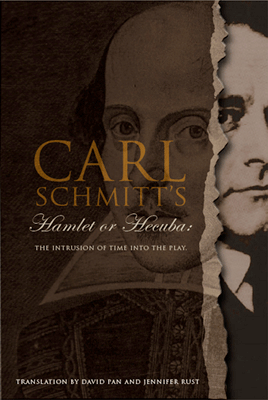
November 2: REQUIRED READING: Carl Schmitt, Hamlet or Hecuba: The Intrusion of Time into the Play (1956) (English trans. Telos Press, 2009), pp. 5-65 and the pages on Shakespeare and on Hamlet in Walter Benjamin's The Origin of German Tragic Drama: pp. 80-84; 123-28; 133-38
Recommended Reading: Jane O. Newman, "Baroque Legacies: National Socialism's Benjamin"; Samuel Weber, "'Ibi et uique": The Incontinent Plot (Hamlet)," inTheatricality as Medium (2004) (get on course reserves); Walter Benjamin, The Origin of German Tragic Drama (Trauerspiel), on allegory and symbol and the demon, pp. pp. 106-15;159-203; 230-35.
Test run of Schmitt's reading of Hamlet: Do the ghost scenes in Hamlet have the same structure? Is Gertrude's death a repetition of Ophelia's?
Recommended Reading: Erich Auerbach, Mimesis chapter "The Weary Prince" (get on UF ares reserve) versus Benjamin, Origin of GermanTragic Drama: secularization as the ghost scenes in Hamlet versus Hamlet as a religious play; Schmitt says it is not a Christian play.
FiIm Screening November 2: Quentin Tarantino, Inglorious Basterds
November 4: Quentin Tarantino, Inglorious Basterds and REQUIRED READING: "Certain Tendencies in Criticism of Shakespeare on Film"
SECOND PAPER DUE NOVEMBER 7 by 5 p.m. Please email it to me at [email protected]
November 9: REQUIRED READING: Detour to Christopher Marlowe's Doctor Faustus (be sure to get the Norton edition as it has both versions [A and B texts]). (you'll need the book)
Compare blood writing in Faustus to writing (tables, books, etc) and reading in Hamlet. Recommended Reading: Peter Stallybrass and Jonathan Goldberg essays on Hamlet
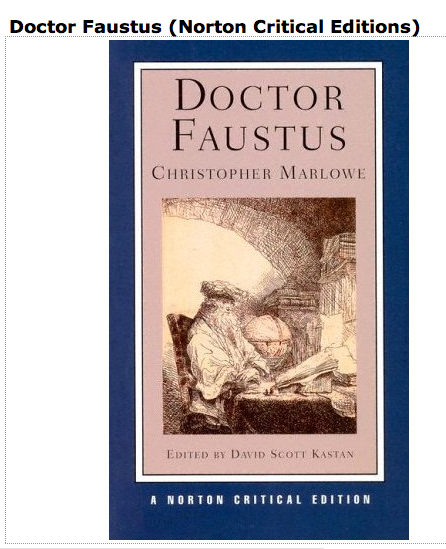
Recommended reading: David Bevington and Eric Rasmussen, ed. Doctor Faustus A- and B-texts (1614, 1616): Christopher Marlowe and His Collaborators and Revisers (NY: St. Martin's, 1993)
November 11: Veterans Day Holiday
November 16: REQUIRED READING: Thomas Kyd, The Spanish Tragedy (you'll need the book)

FiIm Screening November 16 : F.W. Murnau, Faust (1926) and Alex Cox film version of The Revenger's Tragedy (2002)

November 18:
REQUIRED READING: Opening pages from Goethe's Faust and opening pages of Friedrich Kittler's Discourse Networks. (get on UF ares reserve)
Recommended Reading: Lowell Gallagher essay on Faustus and messianic blood (ELH).

FiIm Screening November 23: Alex Cox film version of The Revenger's Tragedy (2002)
November 23: REQUIRED READING: Thomas Middleton, The Revenger's Tragedy
Recommended Reading: Andrew Stofer, "The Skull on the Renaissance Stage" in ELR and Jonathan Gil Harris and Natasha Korda, "Towards a Materialist Account of Stage Properties," in Staged Properties in Early Modern Drama, ed. Jonathan Gil Harris and Natasha Korda (Cambridge UP, 2002), 1-31 (get on UF ares reserve)
November 30: Alex Cox film version of The Revenger's Tragedy (2002)
FiIm Screening November 30: Hamlet 2
REQUIRED READING November 30: Johann Wolfgang von Goethe, Wilhelm Meister's Apprenticeship, (Book Five; online edition: Volume 1 By Johann Wolfgang von Goethe, Thomas Carlyle, Clement King Shorter, Edward Dowden; print (book) edition: Volume Nine of Goethe: The Collected Works, Princeton UP, ed. Eric A. Blackall and Victor Lange), pp. 169-216. (Who is the ghost in Wilhelm Meister's Hamlet production? Should Hamlet live in their production of the play, or not? Goethe's ironizing of the questioning of how German Hamlet is in the German Enlightenment.)
Recommended Reading: Book Four of Wilhelm Meister's Apprenticeship, online edition.
"If [Goethe's] period of duty as a minister had ended in a mood of profound resignation and with his capitulation to the intrigues of a court mistress of the prince, he nevertheless creates at the end of his life, in the setting of an ideal Baroque Germany, a screen on which he projects a magnified image of the world of the statesman in all its ramifications, and at the same time shows all its defects intensified to the point of grotesqueness. Mercantilism, Antiquity, and mystical scientific experiments: the perfection of the state through money, of art through Antiquity, of nature through experiment. These provide the signature of the epoch of the German Baroque which Goethe here invokes."
--Walter Benjamin, "Goethe," Selected Writings 2: 1, 186
December 2: Happy Hamlets, Hamlet After Hamlet After Hamlet: The Theological Challenge to the Enlightenment and Secularization
Hamlet 2 (Why does the happy ending / sequel of Hamlet require the addition of the musical number "Rock Me Sexy Jesus"? Why does Hamlet need a sequel or to be a sequel--to a missing or impossible to identify original source, a Ur-Hamlet? Why do Olivier and Branagh add epilogues showing Hamlet's funeral in their film adaptations? What is the relation between these questions about Hamlet prequels and sequels (sometimes with happy endings) and the question of whether or not Hamlet is a tragedy or a Trauerspiel?
December 7: Course Evaluations and Class Discussion
FINAL PAPER DUE DECEMBER 9 by 5 p.m. Please email it to me at [email protected]
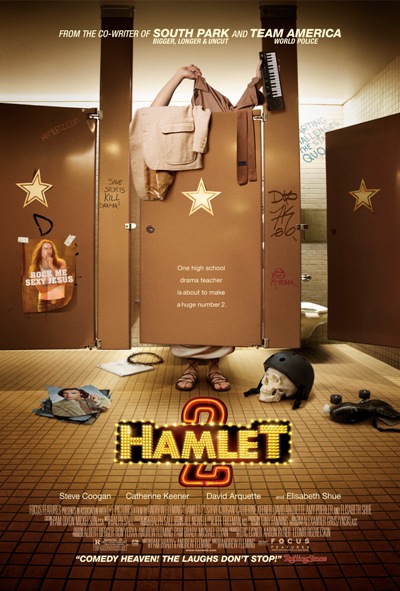
Disclosing Sovereignty: William Shakespeare, Richard II: Politics versus the Political BBC Productions of the Richard II; the deposition scene as a play-within-a-play and as a tragic scene
: Philology and the circle of interpretation (not a step progam, but a "faux pas") Leo Spitzer essay "Linguistics and Literary History" (click on link)
Recommended:
Part Two:
Christopher Marlowe, Edward II (BBC version with Ian McKelln) and The Jew of Malta,
Beaumont, Francis. The Knight of the Burning Pestle.
Part Four:
Part Five: Hamlet before Hamlet and the Play in the Play:
Thomas Kyd, The Spanish Tragedy
Part Six:
Hamlet After Hamlet (Revenger as comic plotter in the manner of Jonson's Volpone)
on tables and tablets (Stallybrass article) and the history of the book, and paintings, and reverse side, and indeterminacy of Rembrandt as secular or sacred. Float the theological uncanny as a framework for the course and a reading of the literature and political theology, history of political philosophy.
Do Scholem tradition essay.
Perhaps The Passion and 10 Commandments. And Passion Gospel medieval stuff.
Part Three:
Clips from El Topo, A Fistful of Dolllars, Queen Margot, Beactrice Cenci (Fulci) and Zeffirelli's Romeo and Juliet
Rene Girard, Violence and the Sacred
Rene Girard, Things Hidden Since the Foundation of the World
Jean-Luc Nancy, Corpus
Detour 2
Historicizing the rise of fascism in The Garden of the Finzi-Continis, Salo,The Damned, 1900, and The Leopard
Sacrificial Violence, and the German-Jewish reception of Renaissance Tragedy and Abraham and Isaac.
Schmitt's influence on Jewish thinkers after the 1940s.
Soren Kirkegaard, Fear and Trembling
Eric Auerbach's chapter "Odysseus's Scar" in Mimesis, 3-23
Jacques Derrida, The Gift of Death (chapter on Kirkegaard's Fear and Trembling)
Carl Schmitt, Hamlet or Hecuba: The Intrusion of Time into the Play (1956) (English trans. Telos Press, October 2009) and
Ken and Juia Reinhard-Luptons' reading of Walter Benjamin and Hamlet; Freud on Hamlet in Interpretation of Dreams and on the uncanny returns of the theological in the secular.
Eric Auerbach's chapter "The Weary Prince," in Mimesis, 3-23.
Brief Return to Hamlet: Rene Girard and Jacques Derrida on Hamlet
Part Seven: Intriguer Versus Intriguer:
Middleton and Rowley, The Changeling
Made for television film adapation of The Changeling
Eric Auerbach chapter "The Arrest of Peter Vavlomeres" in Mimesis, 50-76
St. Paul, Letters to Romans
Giorgio Agamben, The Time that Remains
Returning to Hamlet
The Sur-price of the Work of Art
Let Be: Theatricality as the suspension of the ethical and deferral of violence. Aesthetics and ethical rather than aesthetics and politics
Walter Benjamin, "Philosophy of History"
Emmanuel Levinas, "The Trace of of the Other"
Theological tradition and Literary tradition
Yosef Hayim Yershalmi, Freud's Moses: Judaism Terminable and Interminable
New Haven: Yale University Press, c1991.
Walter Benjamin, "The Storyteller". Aesthetics versus narrative (Literature as retelling)
Three Turk Plays, ed. Daniel Vitkus
Lacan on sacrifice?